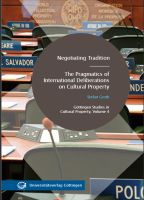Negotiating Tradition - The pragmatics of international deliberations on Cultural Property
| dc.contributor.author | Groth, Stefan, | |
| dc.date.accessioned | 2016-12-31 23:55:55 | |
| dc.date.accessioned | 2019-01-07 13:46:34 | |
| dc.date.accessioned | 2020-04-01T14:13:28Z | |
| dc.date.available | 2020-04-01T14:13:28Z | |
| dc.date.issued | 2012 | |
| dc.identifier | 610300 | |
| dc.identifier | OCN: 842296422 | en_US |
| dc.identifier.uri | http://library.oapen.org/handle/20.500.12657/32550 | |
| dc.description.abstract | Communicative interactions in international negotiations on cultural property not only provide information about the emergence and proliferation of arguments, rhetorics, and registers, but also permit valuable insights into actors’ positions, strategies and alliances. They significantly influence local and national practices and views related to cultural property debates. What can be gained from a deep analysis of the communicative patterns and strategies that actors engage in – the entailing text and talk of negotiations – is a better understanding of the process itself: how do different actors argue, what kind of strategies and rhetorics do they use, to which instruments and institutions do they refer, and in what way do actors react to each other? An analysis of communicative interactions contributes to the question of how international negotiations work. The analytic inclusion of sociolinguistic practices allows insights into positions, strategies, and perspectives pertaining to cultural property. By looking at not only what actors say, but also at how and in what contexts they do so, it is possible to make more accurate statements about their positions and perceptions in cultural property debates. As these communicative interactions influence outcomes considerably, an approach from linguistic anthropology is not only beneficial for an understanding of specific negotiations, but also for the analysis of broader cultural property issues. | |
| dc.language | English | |
| dc.subject.classification | thema EDItEUR::J Society and Social Sciences | en_US |
| dc.subject.classification | thema EDItEUR::J Society and Social Sciences::JB Society and culture: general | en_US |
| dc.subject.classification | thema EDItEUR::J Society and Social Sciences::JB Society and culture: general::JBC Cultural and media studies::JBCC Cultural studies | en_US |
| dc.subject.other | Cultural Property | |
| dc.subject.other | Communicative Interactions | |
| dc.subject.other | Rhetorics | |
| dc.subject.other | Linguistic Anthropology | |
| dc.subject.other | European Union | |
| dc.subject.other | Indexicality | |
| dc.subject.other | Indigenous peoples | |
| dc.subject.other | Intellectual property | |
| dc.subject.other | Opening statement | |
| dc.subject.other | Pragmatics | |
| dc.subject.other | Speech community | |
| dc.subject.other | Traditional knowledge | |
| dc.subject.other | World Intellectual Property Organization | |
| dc.title | Negotiating Tradition - The pragmatics of international deliberations on Cultural Property | |
| dc.type | book | |
| oapen.abstract.otherlanguage | Communicative interactions in international negotiations on cultural property not only provide information about the emergence and proliferation of arguments, rhetorics, and registers, but also permit valuable insights into actors’ positions, strategies and alliances. They significantly influence local and national practices and views related to cultural property debates. What can be gained from a deep analysis of the communicative patterns and strategies that actors engage in – the entailing text and talk of negotiations – is a better understanding of the process itself: how do different actors argue, what kind of strategies and rhetorics do they use, to which instruments and institutions do they refer, and in what way do actors react to each other? An analysis of communicative interactions contributes to the question of how international negotiations work. The analytic inclusion of sociolinguistic practices allows insights into positions, strategies, and perspectives pertaining to cultural property. By looking at not only what actors say, but also at how and in what contexts they do so, it is possible to make more accurate statements about their positions and perceptions in cultural property debates. As these communicative interactions influence outcomes considerably, an approach from linguistic anthropology is not only beneficial for an understanding of specific negotiations, but also for the analysis of broader cultural property issues. | |
| oapen.identifier.doi | 10.4000/books.gup.608 | |
| oapen.relation.isPublishedBy | ffaff15c-73ed-45cd-8be1-56a881b51f62 | |
| oapen.collection | AG Universitätsverlage | |
| oapen.remark.public | Relevant Wikipedia pages: European Union - https://en.wikipedia.org/wiki/European_Union; Indexicality - https://en.wikipedia.org/wiki/Indexicality; Indigenous peoples - https://en.wikipedia.org/wiki/Indigenous_peoples; Intellectual property - https://en.wikipedia.org/wiki/Intellectual_property; Opening statement - https://en.wikipedia.org/wiki/Opening_statement; Pragmatics - https://en.wikipedia.org/wiki/Pragmatics; Speech community - https://en.wikipedia.org/wiki/Speech_community; Traditional knowledge - https://en.wikipedia.org/wiki/Traditional_knowledge; World Intellectual Property Organization - https://en.wikipedia.org/wiki/World_Intellectual_Property_Organization |

